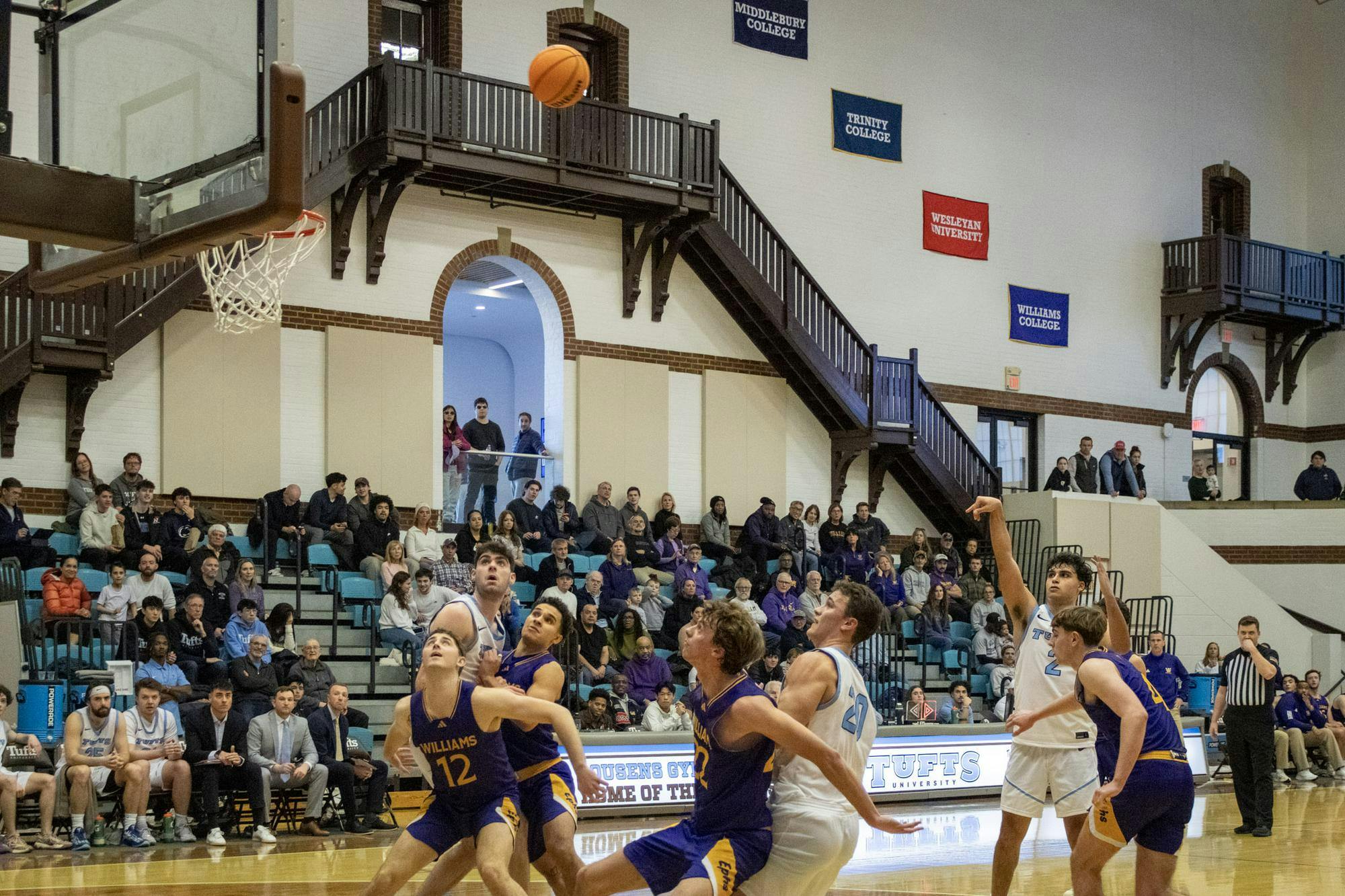Basketball, at its best, is about momentum. Build it, ride it, hold onto it for as long as possible. Lose it, and things unravel quickly. The Tufts men’s basketball team saw both ends of that equation in the NESCAC tournament. A strong second-half surge carried them past Williams in the quarterfinals, but against Trinity in the semifinals, they lost their grip. The Jumbos suffered a 74–51 loss, cutting short their bid for a conference title. But the season isn’t over — far from it. The Jumbos are still dancing with the NCAA Division III Men’s Basketball Championship up next.
Surviving Williams’ comeback bid
Facing Williams in the quarterfinals, Tufts controlled the game early, bolting to an 18-point lead in the first half behind a barrage of 3-pointers from sophomore guards Dylan Reilly and Zion Watt. But Williams didn’t fold. The Ephs stormed back with a 21–5 run to cut the Jumbos’ lead to just 2 points at halftime.
The second half was a dogfight, with both teams trading leads until the Jumbos took over late in the period. Down 6 points with 10 minutes to play, Tufts found its spark — Watt, again. The sophomore drilled four straight threes in a four-minute span, turning a deficit into a lead. Then came junior forward Scott Gyimesi, who controlled the glass, dished out seven assists and iced the game late. The final score read 80–70, sending Tufts to the semifinals for the third straight year.
A rough afternoon in Middletown
Momentum carried Tufts into its showdown with No. 6 Trinity, but it did not stick around. The Jumbos opened strong, jumping out to a 7–1 lead behind 5 quick points from junior center Joshua Bernstein. But the Bantams absorbed the early punch, then threw one of their own. An 18–3 Trinity run flipped the game, and Tufts never fully recovered.
The numbers tell the story. Tufts shot just 32.8% from the field — its second-worst mark of the season. The rebounding battle was not close. Trinity dominated the boards, out-rebounding Tufts 50–33, the worst margin Tufts has faced all year. Foul trouble was another issue, forcing head coach Brandon Linton to rotate lineups more than usual.
Bernstein led Tufts with 11 points on a perfect four-for-four shooting day, but Tufts struggled to generate offense elsewhere. Gyimesi managed just 6 points but grabbed 11 rebounds, while junior guard James Morakis added 10 points. Every attempted Tufts run was met with a quick Trinity answer, and by the time Tufts cut the lead to 13 points with 15 minutes to play, Trinity slammed the door shut.
Trinity’s defense tightened, forcing rushed possessions and denying Tufts clean looks from the 3-point line. The Jumbos, who had relied on their perimeter shooting all season, found themselves unable to generate open shots against the Bantams’ aggressive closeouts. On the other end, the Bantams capitalized on second-chance points, punishing the Jumbos with offensive rebounds and putbacks. By the four-minute mark, the deficit had ballooned to 26 points, and any hopes of a late rally faded. Tufts had no answer for Trinity’s frontcourt dominance, and as the final buzzer sounded, Tufts was left with only one option — turn the page and move on.
Looking ahead
With the NESCAC tournament behind them, the Jumbos now turn their attention to the NCAA tournament.
Bernstein and the Jumbos know they cannot afford to dwell on the NESCAC semifinal loss. “I truly believe we have the best team in D3 basketball 1-18,” Bernstein wrote in a message to the Daily. “And I think that is really the point of emphasis this week. We can’t overreact to a bad 24 hours of Tufts men’s basketball. Our squad has won important games, from last year’s Sweet 16 run to beating top 25 teams this year. We just need to hop back on our brand of basketball — sharing the ball, executing plays, and being a bit tougher both mentally and physically. When we do all of that, we are really unstoppable.”
Tufts will host Yeshiva in the first round on Friday, aiming to regroup and make a deep run in the tournament. The Maccabees come into the tournament after an 18–10 season, finishing 12–4 in their conference. They are led by guard Zevi Samet, a dynamic scorer averaging 22.4 points per game on 39.4% shooting from deep. Alongside him, guard Max Zakheim adds 15.3 points per game while orchestrating the offense.
Tufts is already familiar with Yeshiva, having beaten them 82–74 earlier this season. In that game, Bernstein dominated with a career-high 20 points and 15 rebounds.
Have the Jumbos shown their ceiling? At their best, they are a team that can knock down threes in bunches, dominate the paint and suffocate opponents defensively. At their worst, offensive struggles and rebounding issues can creep in. The challenge they face now is simple: to find their best form at the right time. March is unforgiving, but it also offers second chances. The Jumbos have theirs. Now they have to take it.






